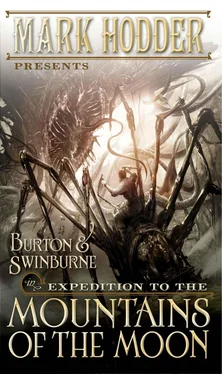Mark Hodder - Expedition to the Mountains of the Moon
Здесь есть возможность читать онлайн «Mark Hodder - Expedition to the Mountains of the Moon» весь текст электронной книги совершенно бесплатно (целиком полную версию без сокращений). В некоторых случаях можно слушать аудио, скачать через торрент в формате fb2 и присутствует краткое содержание. Жанр: sf_stimpank, на английском языке. Описание произведения, (предисловие) а так же отзывы посетителей доступны на портале библиотеки ЛибКат.
- Название:Expedition to the Mountains of the Moon
- Автор:
- Жанр:
- Год:неизвестен
- ISBN:нет данных
- Рейтинг книги:5 / 5. Голосов: 1
-
Избранное:Добавить в избранное
- Отзывы:
-
Ваша оценка:
- 100
- 1
- 2
- 3
- 4
- 5
Expedition to the Mountains of the Moon: краткое содержание, описание и аннотация
Предлагаем к чтению аннотацию, описание, краткое содержание или предисловие (зависит от того, что написал сам автор книги «Expedition to the Mountains of the Moon»). Если вы не нашли необходимую информацию о книге — напишите в комментариях, мы постараемся отыскать её.
Expedition to the Mountains of the Moon — читать онлайн бесплатно полную книгу (весь текст) целиком
Ниже представлен текст книги, разбитый по страницам. Система сохранения места последней прочитанной страницы, позволяет с удобством читать онлайн бесплатно книгу «Expedition to the Mountains of the Moon», без необходимости каждый раз заново искать на чём Вы остановились. Поставьте закладку, и сможете в любой момент перейти на страницу, на которой закончили чтение.
Интервал:
Закладка:
“Tell him to get us moving then, please, Herbert.”
“Rightio. Pardon me, Boss, but would you mind windin' me up first? Me spring is a little slack.”
“Certainly. Fetch me your key.”
The clockwork man shuffled off.
“How are you feeling, Algy?” Burton asked his friend.
“Tip-top, Richard,” Swinburne replied. “Do you think I might have a swig of gin, you know, to ward off malaria?”
“Ha! You're obviously on the mend! And no.”
When Spencer returned, he stood with his back to Burton, and the king's agent, after first checking that the porters couldn't see what he was doing, felt around for the holes that had been cut in the back of the philosopher's many robes, and in the polymethylene suit beneath them. He pushed a large metal key through and into the opening in the brass man's back, then turned it until the clockwork philosopher was fully wound.
Spencer thanked him and went to help get the safari back under way.
It took half an hour for the crowd of men and animals to open out into a long line, like a gigantic serpent, which then slowly made its way westward.
What a sight that column was! At its head, Burton and Trounce rode along on mules, the explorer noting everything in his journal, assessing the geography and geology as Palmerston had ordered, while the Scotland Yard man scanned the route before them with the field glasses. A few yards to the left, Honesty drove the harvestman, while behind, Isabella Mayson and Sister Raghavendra, with dainty parasols held over their heads, rode their mounts sidesaddle. Swinburne, in his stretcher, was carried by four of the Wasawahili, and behind him, the rest of the porters and pack mules followed, all heavily laden. Most of the men carried a single load balanced on their shoulder or head, while others shared heavier baggage tied to a pole and carried palanquin fashion. Each man also bore his private belongings upon his back-an earthen cooking pot, a water gourd, a sleeping mat, a three-legged stool, and other necessities.
The Wasawahili wore little, just rough cloth wound about their loins, and, when the rains came or the sun had set, a goatskin slung over their backs. Some had a strip of zebra's mane bound around their head; others preferred a stiffened oxtail, which rose above their forehead like a unicorn's horn; while many decorated their craniums with bunches of ostrich, crane, and jay feathers. Bulky ivory bracelets and bangles of brass and copper encircled their arms and ankles, and there were beads and circlets around their necks. At least half of them had small bells strapped just below their knees, and the incessant tinkling blended with the heavier clang of the bells attached to the mules' collars. This, along with ceaseless chanting and singing and hooting and shouting and squabbling and drumming, made the procession a very noisy affair, though not unpleasantly so.
At the rear of the long line, Krishnamurthy and Spencer rode their mules and kept their eyes peeled for deserters, but it was Said bin Salim and his eight Askari bully boys who were, by far, the most industrious members of the party. With illimitable energy, they ranged up and down the column, keeping it under tight control and driving the men on with loud shouts of, “Hopa! Hopa! Go on! Go on!”
The expedition soon came upon one of Africa's many challenges: a forest, thick and dark and crawling with biting ants. They struggled through it, with low branches snagging at the loads the porters carried on their heads. Honesty had great difficulty in forcing the harvester through the unruly foliage.
They eventually broke free and descended a long gentle slope into a ragged and marshy valley. Here, the mules sank up to their knees and blundered and complained and had to be driven on by the energetic application of a bakur -the African cat-o'-nine-tails. After a long delay, with the fiery sun beating down on them, they reached firmer ground and struggled up through thick, luxuriant grass to higher terrain. From here, they could see the village of Mkwaju. Once again, the prospect of a gigantic spider approaching sent the villagers racing away.
“This is an advantage I hadn't anticipated,” Burton told William Trounce. “They're too scared of the harvestman to hold us up with demands for hongo. Damnation! If only we had all our vehicles! Without the crabs to clear a route through the jungles, we'll soon reach a point where the harvester will be stymied and we'll be forced to abandon it.”
Mkwaju was little more than a few hovels and a palaver house, but it was significant in that it was the last village under the jurisdiction of Bagamoyo. The expedition was now entering the Uzamaro district.
The sun was at its zenith, and the soporific heat drained the energy out of all of them, but they were determined to reach Nzasa before resting, so they plodded on, glassy-eyed, the sweat dripping off them.
The loss of the harvestman came much sooner than Burton expected. Less than two hours after he'd expressed his concern to Trounce, they encountered a thick band of jungle too dense to chop a wide enough path through and too high for the vehicle to pick its way across. Honesty ran the spider along the edge of the barrier for a mile southward, then back and for a mile to the north. He returned and shouted down from the cabin: “Stretches as far as the eye can see. No way through. Shall I go farther?”
“No,” Burton called back. “It wouldn't do to get separated. I don't want to lose you! We'll have to leave it. We knew it was going to happen at some point. I suppose this is it. And at least the porters will be able to dump the coal supply.”
Honesty turned off the machine's engine and climbed down a leg. “Should destroy it,” he said. “Prussians might follow. Don't want them to have it.”
Burton considered a moment then nodded. “You're right.”
While the safari began to machete its way through the dense undergrowth, the king's agent and the detective tied a rope around the upper part of one of the harvestman's legs and used it to pull the vehicle over onto its side. Honesty drew his Adams police-issue revolver and emptied its chamber into the machine's water tank. They picked up rocks and used them to batter one of the spider's leg joints until it broke.
“That'll do,” Burton said. “Let's press on to Nzasa. The sooner we get there, the better. We're all tired and hungry!”
The band of jungle sloped down to a narrow river. Mosquitoes swarmed over the water and crocodiles basked on its banks. The crossing was difficult, perilous, and uncomfortable, and by the time the expedition emerged from the tangle of vegetation on the other side, everyone was covered with mud, scratches, leeches, insect bites, and stings.
They moved out onto cultivated land and trudged past scattered abodes concealed by high grass and clumps of trees.
They were seeing kraals now-large round huts or long sheds built from sticks woven through with grass. Around these, in a wide circle, thorny barriers had been erected. Constructed by slaver caravans, their presence indicated that the inhabitants of this region were hostile and didn't welcome strangers at their villages.
The trail broadened and the going became easier. They slogged up a hill then descended into the valley of the Kingani River-called Wady el Maut and Dar el Jua , the Valley of Death and Home of Hunger-which they followed until they spotted Nzasa, which Burton knew was one of the rare friendly settlements in the area.
He and Said rode ahead. They were met by three p'hazi , or headmen, each with a patterned cotton sheet wrapped around his loins and slung over his shoulder, each sheltering under an opened umbrella. The Africans announced themselves as Kizaya, Kuffakwema, and Kombe la Simba. The latter, in the Kiswahili language, greeted the two visitors with the words: “I am old and my beard is grey, yet never in all the days I have lived have I beheld a catastrophe like this-the muzungo mbaya once again in the land of my people!”
Читать дальшеИнтервал:
Закладка:
Похожие книги на «Expedition to the Mountains of the Moon»
Представляем Вашему вниманию похожие книги на «Expedition to the Mountains of the Moon» списком для выбора. Мы отобрали схожую по названию и смыслу литературу в надежде предоставить читателям больше вариантов отыскать новые, интересные, ещё непрочитанные произведения.
Обсуждение, отзывы о книге «Expedition to the Mountains of the Moon» и просто собственные мнения читателей. Оставьте ваши комментарии, напишите, что Вы думаете о произведении, его смысле или главных героях. Укажите что конкретно понравилось, а что нет, и почему Вы так считаете.












